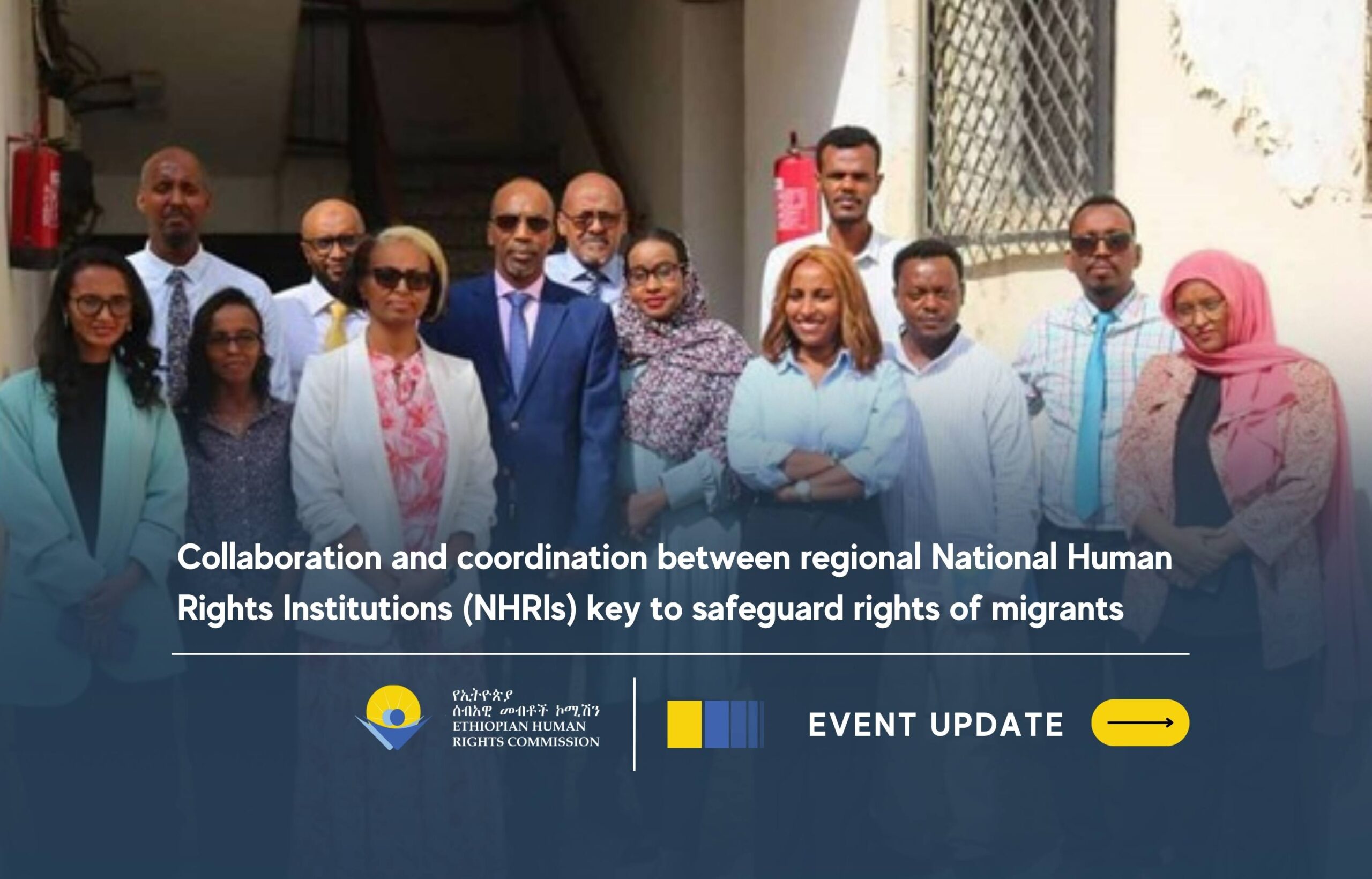A delegation of Ethiopian Human Rights Commission (EHRC) led by Deputy Chief Commissioner Rakeb Messele conducted an experience-sharing and field visit from December 17 – 20, 2023, to Djibouti, intending to explore collaborative opportunities with the Djiboutian National Human Rights Commission (CNDH) regarding the human rights situation of migrants along the Eastern migration route. The visit, facilitated by the German Development Agency (GIZ) – Better Migration Management Programme, involved a series of meetings and engagements with relevant stakeholders in Djibouti, including migrants from Ethiopia.
“I am 25 years old and from Tigray Region. I have decided to migrate to Saudi Arabia in search of a better future. I first migrated to Djibouti, enduring long stretches on foot and cramped vehicle rides. I hope to secure a job as a shepherd in Saudi Arabia. Despite the risks involved, I would rather face the possibility of death while attempting to change my life and support my family, than die without trying in front of my mother.”
A migrant on his way to Saudi Arabia through Yemen
During their stay, the EHRC Delegation held a productive meeting with the Djiboutian National Human Rights Commission (CNDH) leadership, including President Ali Soubaneh Atteyeh, Secretary General Djibril Osman Houfaneh and other members of the Commission. The CNDH Djibouti President congratulated EHRC on being unanimously elected as the first Chair of the IGAD’s Member States’ National Human Rights Institutions (NHRIs) Network, launched in June 2023 to enhance cooperation and dialogue among Member States’ NHRIs. He expressed CNDH Djibouti’s willingness to forge collaborative ties with EHRC on a diverse range of issues, with particular emphasis on safeguarding the rights of migrants.
“I am 17 years old and from Bunno Bedele Zone, Oromia Region. I left home with the hope of changing my life and supporting my family. After enduring a long journey on foot with limited food and water, I finally reached Djibouti. Throughout the journey, we were subjected to beatings by the traffickers. To reach Yemen, I had to pay approximately 130,000 Birr to the traffickers. As we attempted to cross the Saudi border, we were met with gunfire from the border guards. The traffickers urged us to keep running and not to stop. Tragically, some of my friends lost their lives in the shooting, and I sustained a gunshot wound to my leg.”
A child migrant returning from Yemen, after being shot in the leg while trying to cross the border to Saudi Arab
The EHRC Delegation also met with Tanja Pacifico (Ms), Chief of International Organization for Migration (IOM) Mission in Djibouti, to discuss the human rights challenges faced by migrants and IOM’s operations in Djibouti. The Chief highlighted that between January and November 2023, arrivals from Ethiopia are estimated at 110,338, an increase of 21% compared to the same period the previous year (91,144) and the daily average is estimated at 766 migrants. She pointed out that most migrants aimed for the Arabian Peninsula, to reach Saudi Arabia through Yemen, while a small percentage had Djibouti as their destination. She elaborated that the main source regions for migrants from Ethiopia are Amhara, Oromia, and Tigray. This was further confirmed by the Delegation during its visit to the coastal region of Obock. Ms Tanja added that returns of Ethiopian migrants from Yemen seem to increase in the last couple of months, as a result of the humanitarian crisis in Yemen and as border controls in Yemen and Saudi Arabia have been reinforced. Stressing the hardships endured during their journey, she emphasized that migrants grapple with challenges including a lack of shelter, inadequate access to food and water, financial struggles, and obstacles related to sea travel.
I am 19 years old from Harargue, Oromia Region. It has been over five months since I left home. I was told that I would be employed as a domestic worker in Saudi Arabia and be paid 100,000 Birr per month; despite being in the 5th grade and having no prior work experience. I was told by the smuggler to pay 20,000 Birr to facilitate the journey. However, when we reached Djibouti, I was asked to pay an additional 25,000 Birr. I worked as a domestic worker and paid the additional amount. Another female migrant who was not able to pay the additional amount was raped by two of the smugglers.
A female migrant returning to Ethiopia, after being arrested by Yemeni coastal guards
Moreover, the Delegation visited Caritas Djibouti, which provides basic services to child migrants and host communities, held discussions with the National Coordination Bureau for Migration, visited the city of Obock, which is the coastal region of Djibouti where migrants cross the Gulf of Aden towards the Arabian Peninsula and Fontehero, which is the last stop for migrants before departing to Yemen. Additionally, the delegation met with migrants, including individuals who had returned from Yemen.


EHRC’s Deputy Chief Commissioner Rakeb Messele, emphasized the pivotal role of collaboration and coordination between regional National Human Rights Institutions and development partners in safeguarding the rights of migrants. She underscored that such collaborative efforts not only augment the capacity of NHRIs but also bring valuable expertise and resources, foster a multi-stakeholder approach, and facilitate joint advocacy efforts.
